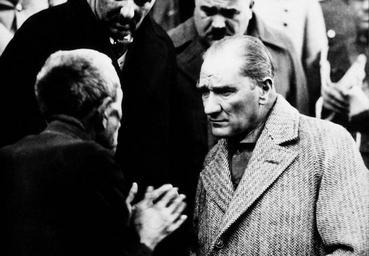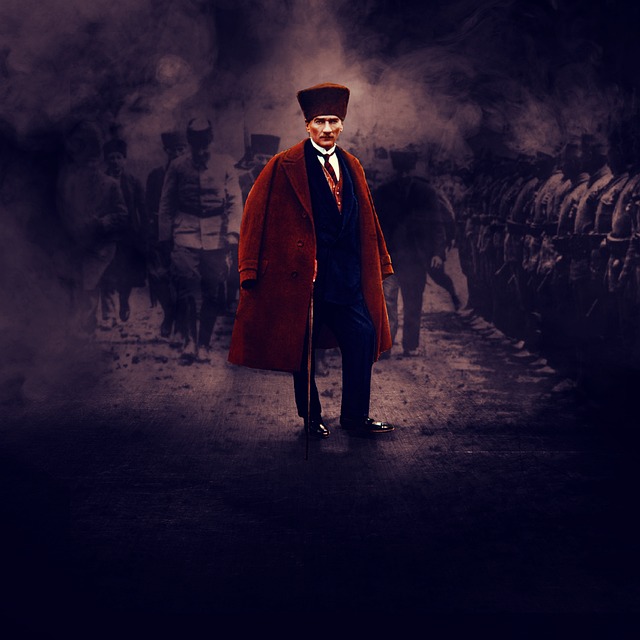Atatürk, as the founding leader of Turkey, stands as a pioneer of modernization and national transformation. The architect of the Republic and a trailblazer in legal and educational reforms, Atatürk presented the Turkish nation with a modern vision, leaving a lasting impact that resonates today.

Mustafa Kemal Atatürk's family played a significant role in his life, leaving a lasting mark on Turkish history. Atatürk's family consisted of the following members:
Zübeyde Hanım: Born in 1857 in Thessaloniki, Zübeyde Hanım was Mustafa Kemal's mother. Their bond during Atatürk's childhood was strong. Zübeyde Hanım supported her son's determination in the struggle for independence and played a crucial role in shaping his leadership qualities.
Ali Rıza Efendi: Atatürk's father, Ali Rıza Efendi, was born in 1864 in Kocacık village. He had various occupations such as military service, farming, and working as a railway officer. Ali Rıza Efendi passed away during Mustafa Kemal's childhood.
Latife Hanım: The wife of Mustafa Kemal Atatürk, Latife Hanım, was born in 1898 in Izmir. The couple married in 1923 and divorced in 1925. Latife Hanım is known as a modern Turkish woman who contributed to Atatürk's social and cultural reforms.
Mustafa Kemal Atatürk's family supported him during various periods of his life and played crucial roles in the Turkish nation's struggle for liberation and modernization. The influence of his family was decisive in shaping Atatürk's personal and leadership qualities.
Mustafa Kemal Atatürk's childhood began in 1881 in Thessaloniki. His family, consisting of his mother Zübeyde Hanım and father Ali Rıza Efendi, belonged to the middle class. His father, Ali Rıza Efendi, was a civil servant with various occupations.
Atatürk's childhood unfolded within the social structure of the Ottoman era. Thessaloniki, being a city of ethnic and cultural diversity, exposed him to different cultures during his formative years. At a young age, Atatürk was known for his developed observational skills, curiosity, and bravery.
The death of his father, Ali Rıza Efendi, marked a significant period in Atatürk's childhood. Despite financial difficulties in the family, this event strengthened Atatürk's dedication to education and determination. After completing primary school in Thessaloniki, Mustafa Kemal began military training at the Military Academy.
His keen observational skills, leadership qualities, and determined personality acquired during childhood played crucial roles in his later years, especially during the struggle for independence and the establishment of the Republic of Turkey.
Mustafa Kemal Atatürk's education began in his childhood and significantly influenced his leadership career. Starting his primary education in Thessaloniki, Atatürk continued his education despite the death of his father and the family's financial struggles.
After completing the Selanik Military Junior High School, he decided to pursue a military career. In 1895, he entered the Istanbul Military Academy. The education at the academy helped develop military discipline and strategic thinking. His achievements during this period contributed to his rise to important military positions in the following years.
Mustafa Kemal graduated from the Military Academy in 1905, becoming a staff officer. His leadership, strategy, and courage displayed during the Balkan Wars and World War I elevated him to a prominent figure in the eyes of the Turkish nation.
His commitment to learning and knowledge extended beyond the military field. Atatürk always valued education. The reforms he implemented after the declaration of the Republic, such as the adoption of the Civil Code and the change of the Turkish alphabet, modernized and secularized the education system.
Mustafa Kemal Atatürk's education played a crucial role in shaping his leadership journey. His determination for education and hunger for knowledge were decisive factors in the establishment of the Republic of Turkey and the modernization process.

Mustafa Kemal Atatürk's military career stood out for his leadership and strategic brilliance during the Turkish nation's struggle for independence. Here are some of Atatürk's significant military achievements:
Gallipoli Campaign (1915-1916): Mustafa Kemal displayed heroism in the Gallipoli Campaign, stopping the enemy's advance and securing a victory for the Turkish army. His leadership skills during this battle were early indicators of his military genius.
World War I (1914-1918): Mustafa Kemal served in various fronts during the Ottoman Empire's involvement in World War I. Particularly notable were his successes in the Gallipoli Campaign and the Battle of Kut al-Amara, showcasing his leadership abilities.
Battle of Sakarya (1921): A pivotal moment in the Turkish War of Independence, the Battle of Sakarya, led by Mustafa Kemal, resulted in a significant victory against the Greek army. This triumph marked a crucial step toward Turkey's independence.
Great Offensive and Battle of Commander-in-Chief (1922): One of the most important victories of the Turkish War of Independence, the Great Offensive and Battle of Commander-in-Chief, ended with the Turkish army led by Mustafa Kemal emerging victorious. This triumph, celebrated on August 30, 1922, strengthened Turkey's independence.
Mustafa Kemal Atatürk's military achievements not only showcased his strategic brilliance on the battlefield but also reflected his leadership abilities and determination in the struggle for independence. These successes contributed to his unique status as a leader in the eyes of the Turkish nation.
Establishment of the Republic: After the collapse of the Ottoman Empire, Atatürk declared the Republic of Turkey in 1923, symbolizing a transition from a monarchical structure to a national republic.
Legal and Political Reforms: Atatürk initiated profound legal and political reforms in Turkey. Legal regulations such as the Civil Code, Turkish Penal Code, and Execution and Bankruptcy Law aligned with Western norms, paving the way for Turkey to adopt a modern legal system.
Educational Reforms: Atatürk took significant steps to modernize the education system. Reforms included the Turkification of foreign-origin words, the transition of the Turkish alphabet to the Latin alphabet, and the introduction of contemporary knowledge and values to the Turkish youth, leading to substantial changes in education.
Principle of Secularism: Atatürk aimed to build Turkey as a secular state. Measures such as the separation of religion and state affairs and the elimination of religious education strengthened secularism while preserving individuals' freedom of religion.
Women's Rights: Atatürk actively worked towards empowering women socially and politically. The law in 1934 granting women the right to vote and stand for election in Turkey was a significant milestone in this effort.
Economic Transformation: Atatürk implemented crucial measures in the economic sphere. The establishment of Ministries of National Industry, Economics, and Commerce, along with changes in agricultural and industrial policies, aimed to strengthen Turkey's economic independence.
Mustafa Kemal Atatürk's legacy is imbued with the profound effects he left on the shaping of the Turkish nation into a modern, secular, and democratic nation-state. His principles have served as a guiding framework in Turkey's journey toward modernization.